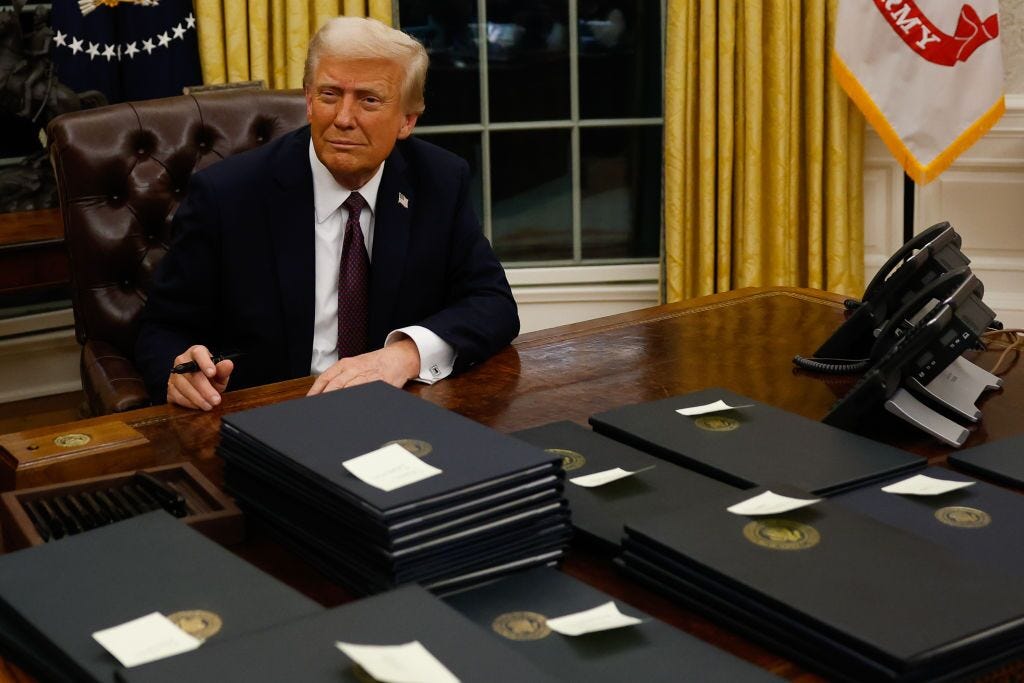Too Much TV: Senate Republicans Pass Recissions Bill That Targets PBS & NPR
The bill now goes back to the House, where it must be passed by Friday.
Here's everything you need to know about the world of television for Tuesday, July 15th 2025:
SENATE REPUBLICANS NARROWLY PASS SPENDING CUTS PACKAGE THAT INCLUDES NPR & PBS FUNDING
Senate Republicans voted Tuesday night on a procedural move that would advance a $9.4 billion recissions package. The bill would roll back $1.1 billion in funding to PBS, NPR and public media that had already been allocated over the next two years.
The vote passed 51-50, with every Democrat voting against it, along with Republican Senators Susan Collins of Maine, Lisa Murkowski of Alaska and Mitch McConnell of Kentucky.
The procedure is a bit complicated, but the bill is being passed through a filibuster-proof process that gives Congress 45 days from the time of the White House request to get it to the president's desk. That deadline is Friday.
The House narrowly passed the package last month, 214-212, with four Republicans voting against it.
Today, the Senate passed a version of the bill that removes about $400 million in cuts to a foreign aid program to combat HIV/AIDS. That was the only way several Republicans would vote for the bill. But because of that change, the bill now has to go back to the House to be approved before the Friday deadline.
In an interview with Deadline (I'm a bit jealous), PBS CEO Paula Kerger discussed the bill and the impact it might have on its member stations:
So I think there are a lot of questions. What we’ve tried to do over the last couple of months since this whole debate began around funding is just to make sure that people understand the impact. People are always confused about public broadcasting. They think that PBS is like CBS, that we’re a network, and obviously we’re not.
We are a federated system. Our stations are all locally owned, locally operated, locally governed. In many parts of the country, they’re the only local media stations left in some communities. They may be the only television station, radio station. They make all the decisions, [including] what they put on the air. PBS was created by them to be able to create a scale [for] programs that they’re all interested in.
That’s the vast array of programs we have for kids, especially those that aren’t enrolled in pre K… It’s about helping to bring forward great projects like Ken Burns’ series on the American Revolution, which will premiere in November. It’s about really supporting a broad range of programming that is of interest to communities. And so if the funding goes away, the real consequence of it is the impact on local stations.
Seventy percent of the [federal] money goes directly to stations. And for some stations, that percentage of their budget could be 10% or 15%. But for a lot of stations, particularly in rural communities, that percentage is 40%. or in some of the most extreme cases, more than 50% of their funding. And for those stations, it’s existential.
At the same time this recission bill is making its way through Congress, the Trump Administration has renewed efforts to remove three board members from the Corporation for Public Broadcasting (CPB). In April, In April, the Trump Administration gave notice to Tom Rothman, Laura Ross and Diane Kaplan that they were being fired from the board. The CPB then sued to block the move, arguing the President had overstepped its authority. It also changed the bylaws to restrict interference from the White House
In May, a federal judge ruled against CPB's request to permanently block the removals, but also noted the change in bylaws that would prevent the removals from taking place.
On Tuesday, the Justice Department filed a complaint, arguing the three targeted board members have “continued to usurp the office of board member of the CPB, including by participating in board meetings, voting on resolutions and other business that comes before the board, and presenting themselves to the public as board members. All of this is manifestly unlawful.” The complaint goes on to say that since the request for removal came on April 28th and the change in bylaws wasn't approved until May 15th, the courts should declare the three board members are no longer serving, along with ruling that all of their actions at the CPB since April 28th are "null and void."
THINGS YOU SHOULD BE WATCHING
Here are a few programs that should be on your radar this week:
Trump’s Power & The Rule Of Law (PBS, Tuesday)
If you want an example of why PBS is so vital, this Frontline special is a perfect example. The episode looks at President Trump's efforts to amass and wield power over his first six months since returning to the White House, and writer/director Michael Kirk manages to frame a complex issue in a way that any viewer can understand.
While there is a component to this of Trump wanting to have control over as much of the government apparatus as possible, he's aided by some people who above all believe in the idea of a "unitary executive theory," which basically argues that because the President is the only person who was voted on by the entire country, the executive branch should have the freedom to enact his or her legislation and make it happen. It's the end point of Richard Nixon's argument that if a president does it, it's legal.
One thing that sets the episode apart from the reporting in other documentaries is that it includes interviews with both opponents and supporters of President Trump's efforts. Most notable are some of the comments from attorney Mike Davis as well as conservative force Steve Bannon, who described the Trump efforts this way: "We don’t blink, we’re not going to blink, we’re not going to cave. We’re on it. We’re coming up full blast. Everybody else will collapse. We’re warriors."
7 Bears (Netflix)
Writing about a kids show is challenging if you no longer have young children in your household. So then it really comes down to trying to put yourself in the mindset of someone under the age of eight. Is the show loud and chaotic? Is it filled with dumb jokes that would likely amuse a youngster? Is it the type of show that you'll likely learn to hate if your children force you to watch it every day?
The new Netflix animated series 7 Bears answers "yes" to all of those questions and it is a delightfully stupid, rude and insanely frantic experience to watch. The premise is ripped right of the public domain, with the series essentially being "It's Snow White and the Seven Dwarves, except the dwarves are tiny bears." Snow White is part of the show, although often annoyingly so. But what matters are the wee little deranged bears, who tumble, scream and collide through every scene. It's a bit like The Three Stooges, except all seven of them are Curley. And all of them are taking massive doses of Adderall.
Apocalypse In The Tropics (Netflix)
Petra Costa did not produce her documentary in hopes that viewers in America would see a reflection of this country in her recounting of the impact that a melding of evangelical Christianity had on Brazil. But U.S. viewers will find much of the story resonates a lot stronger than it might have a year or two ago.
By some estimates, the percentage of Brazilians who self-identify as evangelical Christians has grown over the past 40 years from around 5% to more than 30%. That increase has had a profound impact on Brazilian society and its political landscape.
The documentary is centered on Pentecostal televangelist and celebrity Silas Malafaia, whose influence on his followers and ability to marshal the rich and important to his causes helped make the rise of former President Jair Bolsonaro possible. His support implied that somehow Bolsonaro was God's chosen one and that supporting him wasn't just a political choice, it was implicitly following the will of God.
As we've seen in the United States, Brazilian religious leaders such as Malafaia were willing to lend their public support to politicians such as Bolsonaro in exchange for access to political power and promises of making evangelical Christianity a central part of Brazilian society. To many of Bolsonaro's supporters, the evolution of Brazil from a Democracy to a Theocracy was a goal. And it was a goal that seemed increasingly in reach.
And in the same way that evangelical Christians in America embraced Donald Trump and proclaimed him as "the one God chose to save America," Malafaia and others in Brazil embraced Bolsonaro and defended him, even as the country began to turn against him.
That defense has complicated Bolsonaro's electoral battle with Luiz Inácio Lula da Silva and many evangelical Christians continue to believe Bolsonaro was somehow unfairly targeted by opponents driven by some evil force. And it is probably not a coincidence that Donald Trump has recently threatened Brazil with massive tariffs as the country continues its prosecution of the former Brazilian semi-dictator.
Apocalypse In The Tropics is a compelling story about a country and its politics that might be unfamiliar to people outside Brazil. But the events are also a warning to other democracies as the walls between church and state continue to fall.
And as this documentary shows, the weakening of those walls almost never ends well for Christians or for the country.
Catalog (Netflix, Wednesday)
One of the joys of having access to global television shows is seeing how other cultures tackle topics already familiar to American audiences. The premise of this series set in Egypt might have some well-known notes, but it is an absolute delight to watch. And it does a great job providing a glimpse into what family like looks like in a country that many Americans don't have much knowledge of past "they have some pyramids."
Youssef (Mohamed Farrag), finds himself responsible for raising his two children after the death of his wife, Amina (Riham Abdel Ghafour). He struggles to comfort them and provide some stability in the midst of learning how to be the parent they need. He's overwhelmed until he discovers a series of parenting videos his late wife had recorded before she died. Through her videos and his love for her and the children, he slowly begins to build the life both he and his kids need.
Catalog is just a delightful show and I hope that American audiences give this Arabic series a chance.
THE NY TIMES TO REPLACE ITS FOUR CULTURE CRITICS
The NY Times is replacing four of the paper’s TV, music and theater critics, who are being offered “new roles,” according to an internal memo obtained by Variety. That includes long-time television critic Margaret Lyons. The four will “be taking on new roles, and we will be conducting a search for critics on their beats in the weeks to come,” New York Times culture editor Sia Michel wrote in a memo to staffers on Tuesday afternoon:
“We are in the midst of an extraordinary moment in American culture. New generations of artists and audiences are bypassing traditional institutions, smartphones have Balkanized fandoms even as they have made culture more widely accessible than ever, and arts institutions are facing challenges and looking for new opportunities,” Michel wrote.
“Our readers are hungry for trusted guides to help them make sense of this complicated landscape, not only through traditional reviews but also with essays, new story forms, videos and experimentation with other platforms,” she wrote in the memo. “Our mission is to be those guides,” she continued. “As we do so, I am making some changes in assignments in the department.”
I'm not sure what impact this will have on the paper's culture reporting. But reassigning the entire critic staff at one time is likely not a great sign.
ODDS AND SODS
* Long-time Elon Musk and Tesla chronicler E.W. Niedermeyer has discovered that a 2018 episode of 60 Minutes has been removed from streaming, in which Elon Musk was using Autopilot hands-free on a Tesla while being interviewed by Lesley Stahl.
* In a twist so uncomfortable it almost made my ears bleed, Kevin Spacey demanded the government "release the Epstein files," saying, "For those of us with nothing to fear, the truth can’t come soon enough."
* Chip Gaines has gone onto social media to push back over complaints from some Christians who are unhappy with the presence of a gay couple on the new Magnolia series Back To The Frontier.
* The All Star Game tribute to Hank Aaron focused on his efforts to break Babe Ruth’s home record, but skipped over any mention of the virulent racism he faced chasing that record.
CHART OF THE DAY
WHAT'S NEW TONIGHT AND TOMORROW
WEDNESDAY, JULY 16TH:
* Amy Bradley Is Missing (Netflix) - (first look video)
* Bullet Bullet Series Premiere (Hulu)
* Low Life Series Premiere (Hulu)
* Pigs (Britbox)
* The Summer I Turned Pretty (Prime Video)
* To Catch A Smuggler Season Premiere (NatGeo)
* 2025 ESPY Awards (ABC)
* Tyler Perry's Sistas Season Nine Premiere (BET+)
THURSDAY, JULY 17TH:
Catalog Series Premiere (Netflix)
Community Squad (Netflix)
DeExtention (Curiosity Stream)
Family Recipe Showdown Series Premiere (Food)
Homicide Squad: New Orleans Season Premiere (A&E)
Star Trek: Strange New Worlds Season Three Premiere (Paramount+)
Surf Girls (Prime Video)
The Furry Detectives: Unmasking A Monster (Sundance)
The Vince Staples Show (Netflix)
Untamed (Netflix)
SEE YOU ON WEDNESDAY!









It's a testament to the programming that anyone still believes at this point on the timeline...
How TV creates Reality
3 things humans need to know about their programming devices.
1> The intros with spinning globes and flashing lights facilitate a state of "Instant Induction Hypnosis".
2> The 60 Hz Lilly Wave. Embedded in the electromagnetic field of all monitors, put you in a lucid, trance-like state.
3> And when you realize the predictive programming aspect, it blows the mind wide open.
When you see the imagery, and feel the feelings. It is the core of manifestation, It is like planting seeds in your garden that you grow for them. To manifest their version of reality.
Predictive Programming Propaganda Breakdown
https://open.substack.com/pub/exhibitx/p/a-cheat-code-for-reality